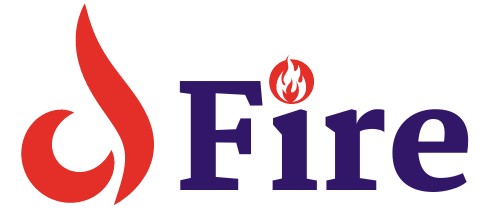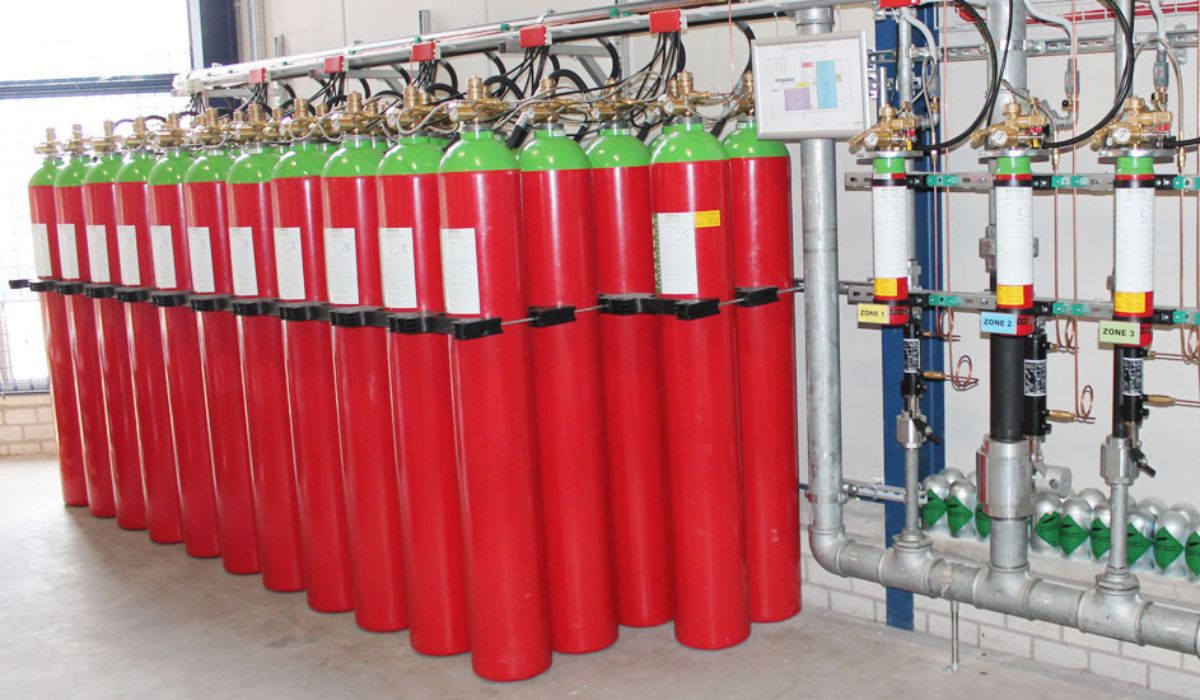Inergen Fire Suppression is an effective gas-based solution for quenching fires without damaging sensitive equipment. It safeguards both property and personnel by rapidly extinguishing flames without leaving any residue.
Inergen systems deploy a blend of naturally occurring gases—typically nitrogen, argon, and carbon dioxide—to reduce oxygen levels around a fire. This colorless, odorless mixture is environmentally friendly and poses no harm to human health. Designed to react quickly, Inergen extinguishes fires by lowering the oxygen concentration to a level that sustains human life but not combustion.
Ideal for areas with valuable or electronic assets, it prevents the collateral damage often seen with water or chemical-based systems. Its efficacy and safety features make Inergen a preferred choice for server rooms, archives, and museums, ensuring crucial data and artifacts are protected during fire emergencies.

Credit: www.gminsights.com
Introduction To Inergen Fire Suppression
Safeguarding people and property from fire is essential. Inergen Fire Suppression offers a unique solution. It is clean and secure. This system combats flames without leaving residue. It protects life and delicate assets alike.
The Evolution Of Fire Suppression
Fire safety has advanced significantly. Early methods used water and foam. Modern technology demands safer and cleaner options. Inergen systems represent this advancement. They use gases that do not harm electronics or humans.
Traditional systems had downsides. They could damage the environment or property. Inergen is different. It is a blend of natural gases. This includes nitrogen, argon, and carbon dioxide. These gases are all around us. They effectively extinguish fires. They minimize damage and downtime.
Key Properties Of Inergen
Its key properties set Inergen apart from others. Here’s what you should know:
- Safe for Humans: Low in toxicity, safe to breathe in occupied spaces.
- No Residue: Leaves no residue behind, protecting sensitive equipment.
- Zero Ozone Depletion: Eco-friendly, it safeguards the atmosphere.
- Instantaneous Action: Reacts quickly to suppress fires fast.
These properties ensure minimal impact on the environment. They also ensure peace of mind for safety managers and business owners.

Credit: hillerfire.com
How Inergen Works To Extinguish Fires
Understanding how Inergen works to extinguish fires is crucial for safety. Inergen is not just any fire-fighting method. It’s a blend of natural gases that stops fires without harming people or equipment. Let’s dive into what makes Inergen special and how it fights fires.
Chemical Composition Of Inergen
Inergen is safe and clean. It is a mix of three naturally occurring gases. These gases are nitrogen, argon, and carbon dioxide. Nitrogen makes up 52%, argon is 40%, and carbon dioxide is 8% of this mixture. There are no chemicals that can hurt the environment in Inergen.
Mechanism Of Fire Suppression
The way Inergen stops a fire is fascinating. Inergen fights fires by reducing the oxygen level. It brings it down to where fires can’t burn but people can still breathe. It’s like putting a blanket over the fire. The fire gets smaller because it does not have enough oxygen.
Unlike water or foam, Inergen doesn’t damage things. This is good for places with computers or art. When Inergen is used, we can go back to normal quickly after a fire.
Benefits Of Using Inergen
Inergen fire suppression systems provide cutting-edge safety measures. These systems guard against fire without harming the environment or endangering human lives. They also protect delicate machinery. Below are key benefits that make Inergen a top choice.
Environmentally Friendly Approach
Inergen is an innovative fire suppression solution. It fights fires without leaving behind harmful residues or gasses. The blend of naturally occurring gases—nitrogen, argon, and carbon dioxide—does not deplete the ozone layer. This quality makes Inergen a green and sustainable option.
- Ozone depletion potential: Zero
- Global warming potential: Zero
- Atmospheric lifetime: Instantaneous
Safety For Occupants
Safety comes first with Inergen. Unlike other fire suppressants, it reduces oxygen levels to extinguish fires while maintaining a breathable atmosphere. This means people can safely evacuate during an emergency. It’s a reliable system for spaces where people work and live.
| Oxygen Levels | Safety |
|---|---|
| 12-15% | Fire suppressed, air breathable |
Protection For Sensitive Equipment
Valuable equipment needs gentle care. Inergen’s clean agent properties mean it won’t damage electronics or other sensitive items. There’s no residue or water, so nothing gets wet or dirty after deployment.
Key items protected include:
- Data servers
- Telecommunication systems
- Artwork and historical artifacts
Comparing Inergen To Other Fire Suppressants
Protecting assets and lives from fire involves choosing the right suppression system. Inergen systems emerge as a clean and efficient alternative to traditional methods. We delve into how Inergen stacks up against common fire suppressants to help you make an informed decision.
Inergen Vs. Halon-based Systems
Inergen proves safer for the environment and humans when compared to Halon systems. Halon, once a popular choice, now faces bans due to its ozone-depleting properties. In contrast, Inergen is a blend of naturally occurring gases, making it ozone-friendly. It reduces oxygen levels to suppress fires without harming the ozone layer.
Inergen Vs. Water Sprinklers
Water sprinklers can damage electronics and documents. Inergen, being a gas, leaves no residue and is thus ideal for data centers and archives. It ensures critical operations continue without the downtime caused by cleanup.
Performance In Various Scenarios
Inergen’s versatility across different scenarios is noteworthy. Its effectiveness is unmatched, especially in enclosed spaces where electronics are present. Fast-acting and residue-free, Inergen maintains equipment integrity and provides a quick return to normal operations post-incident.
| Scenario | Inergen | Halon | Water Sprinklers |
|---|---|---|---|
| Environmental Impact | No ozone depletion | Ozone depletion | N/A |
| Residue | No residue | No residue | Causes water damage |
| Application | Enclosed spaces | Banned in many areas | General use |
| Electronics Safety | Safe for electronics | Safe for electronics | Can cause damage |
| Human Safety | Safe to breathe | Potential asphyxiant | Generally safe |
- Inergen is non-toxic and safe for people.
- It does not conduct electricity.
- Operational downtime is minimized.
Installation And Maintenance Of Inergen Systems
Ensuring the safety of your business with proper Inergen fire suppression system installation and maintenance is essential. These systems protect valuable assets and lives in the event of a fire. To guarantee effective performance, correct installation and regular maintenance are non-negotiable. In this piece, we outline key elements for system design, alongside vital routine maintenance procedures.
System Design Considerations
When planning an Inergen system installation, understanding your space and needs is vital. Below are factors to consider.
- Space Assessment: Measure the room where the system will go.
- Hazard Level: Determine what type of fire risks exist.
- Building Codes: Follow local fire safety codes.
- System Capacity: Ensure your system can cover the area.
- Component Placement: Install detectors and nozzles strategically.
Routine Maintenance Procedures
To keep your Inergen system at peak readiness, perform these maintenance steps:
- Inspect Extinguishers: Check the pressure gauges monthly.
- Nozzle Check: Clear any blockages from the nozzles.
- Alarm Tests: Run alarms to ensure they are loud and clear.
- Professional Inspections: Have experts review the system yearly.
| Maintenance Task | Frequency |
|---|---|
| Pressure Check | Monthly |
| Nozzle Inspection | Quarterly |
| Alarm Functionality | Semi-Annually |
| Expert Review | Annually |
Regular maintenance ensures your Inergen system will work when you need it most. Keep this schedule in mind to secure your premises from fire dangers.

Credit: www.gielle.it
Case Studies: Inergen In Action
Witness how Inergen Fire Suppression performs in the real world. These case studies showcase its effectiveness in different scenarios. Learn how Inergen guards crucial assets and facilities against fire.
Protecting Data Centers
Data centers hold sensitive info. Inergen keeps them safe without harming tech gear. Check out these application highlights:
- Zero downtime – Inergen’s swift action prevented data loss during critical operation hours.
- Safe for electronics – No residue means no damage to sensitive servers and hardware.
- Fact: Inergen maintained optimal environment for tech by not removing oxygen.
Historical Building Applications
Inergen protects history. It reduces damage risk during a fire in old structures. See its impact:
| Building | Benefit |
|---|---|
| Libraries | Books stay unharmed; no water damage. |
| Museums | Artifacts safe; no chemical aftermath. |
Industrial And Chemical Plant Protection
Inergen shines in plants where risks are high. Its benefits include:
- Non-reactive – Won’t fuel chemical fires.
- Human safe – Staff can escape without harm.
- Fires controlled fast, minimizing asset loss.
Regulations And Standards For Inergen Systems
Regulations and Standards for Inergen Systems are critical for ensuring fire safety. Inergen, a blend of natural gases, suppresses fires without harming the environment or people. It’s crucial that Inergen systems comply with strict international and local regulations. This guarantees maximum effectiveness and safety during fire emergencies.
International Fire Safety Standards
Inergen fire suppression systems must meet global safety standards. These standards ensure consistent quality and performance worldwide. Key international organizations set these benchmarks. These include the National Fire Protection Association (NFPA) and the International Organization for Standardization (ISO).
- NFPA 2001: Standard on Clean Agent Fire Extinguishing Systems
- ISO 14520-1: Gaseous fire-extinguishing systems – Physical properties and system design
Compliance And Certification Processes
Compliance with standards is not optional; it’s mandatory. Each Inergen system undergoes rigorous testing and certification. This process involves:
- Design and installation according to codes
- Inspection by certified professionals
- Regular maintenance checks
Certified Inergen systems receive approval from recognized bodies like Underwriters Laboratories (UL) and Factory Mutual (FM) Global. These certifications confirm systems perform correctly and safely.
Future Of Fire Suppression Technologies
As technology advances, so do the methods we rely on to keep us safe from fire hazards. The future of fire suppression technologies promises innovative solutions that are not only effective but also environmentally friendly and safe for human exposure. One of the advanced solutions at the forefront of this revolution is Inergen Fire Suppression.
Innovation In Inert Gas Systems
Inert gas systems, like Inergen, represent a giant leap in fire suppression technology. These systems extinguish fires without harming people or the planet. Here are a few key innovations:
- Zero Ozone Depletion Potential: Safe for the Earth’s atmosphere.
- Non-Conductive: Ideal for protecting electrical equipment.
- Residue-Free: No clean-up required after discharge.
Inergen systems are expanding their reach, safeguarding data centers and historic landmarks alike.
Emerging Trends In Fire Safety
Emerging trends in fire safety highlight the importance of advanced warning systems and minimal impact suppression agents. The latest trends include:
| Trend | Benefits |
|---|---|
| Smart Detection | Quick and targeted response to fires. |
| Eco-friendly Agents | Protect the environment while fighting fires. |
| Automated Systems | Efficient suppression without human intervention. |
With new developments every day, the future of fire suppression is dynamic and promising, ensuring safety in ways we have never seen before.
Frequently Asked Questions For Inergen Fire Suppression
What Is An Inergen Fire System?
An Inergen fire system is a clean agent fire suppression system that deploys a mixture of gases to extinguish fires without harming equipment or people. It is ideal for sensitive environments and leaves no residue.
What Is The Difference Between Fm-200 And Inergen?
FM-200 is a clean agent fire suppressant, chemically known as HFC-227ea, effective at low concentrations. Inergen is an inert gas blend of nitrogen, argon, and carbon dioxide, reducing oxygen levels to extinguish fires without harming humans. Both are eco-friendly but use different extinguishing methods.
Is Inergen Gas Harmful To Humans?
Inergen gas, a blend of nitrogen, argon, and carbon dioxide, is non-toxic and safe for humans at appropriate concentrations during fire suppression.
What Is The Difference Between Halon And Inergen?
Halon is a chemical-based fire suppressant, potentially harmful to the ozone layer. Inergen, an inert gas blend, extinguishes fires without affecting the ozone and is nontoxic.
Conclusion
Choosing the right fire suppression system is crucial for safety and asset protection. Inergen stands out as a trusted option to safeguard both people and property. With its eco-friendly approach, there’s little doubt about its effectiveness in emergencies. Ensure peace of mind by considering Inergen for your fire defense needs.
Invest in a reliable solution today.

I’m Abdus Sobur, a highly skilled and professional Fire Safety Officer with a passion for safeguarding lives and property. Over the course of my career, I’ve conducted numerous successful fire safety audits, earning a reputation for excellence in ensuring public safety.
In addition to my role as a Fire Safety Officer, I’m also dedicated to raising awareness about the importance of fire safety. Through my blog, I share insights into the functions of different fire safety equipment, aiming to empower individuals with the knowledge they need to protect themselves and their communities.
I’m driven by a deep commitment to promoting fire safety awareness and preventing fire-related incidents.

